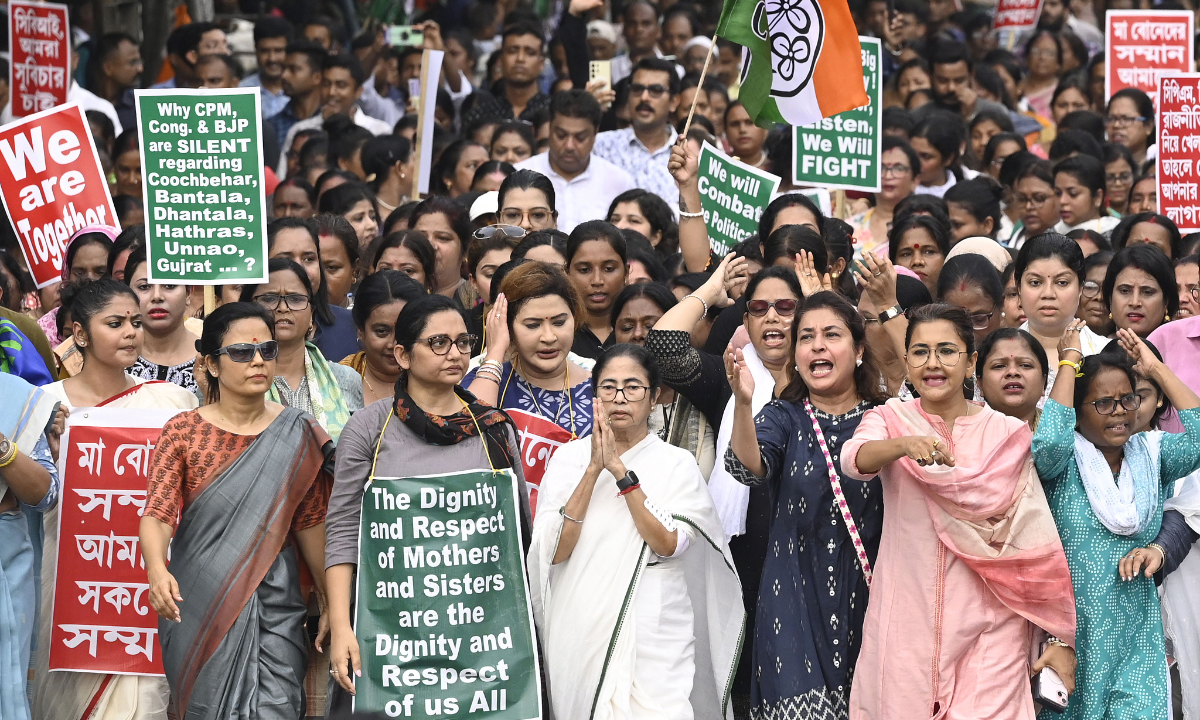Massive protests erupt following rape and murder of doctor, sparking reflection on when Indian women will achieve real independence

Photo: VCG
Hospitals and clinics across India turned away patients except for emergency cases on Saturday as medical professionals started a 24-hour shutdown in protest against the brutal rape and murder of a doctor in the eastern city of Kolkata, Reuters reported.
More than one million doctors were expected to join the strike, paralyzing medical services across the world's most populous nation, read the report.
Indian women are experiencing a surge of intense anger as they unite in the massive protests and doctor strikes, sparked by the brutal killing of a trainee doctor at a state-run hospital on August 9.
Chinese experts said the high incidence of rape cases in India reflects the low social status of women, which may be due to the deep-rooted disrespect of Indian men toward women, coupled with limited access to education and employment opportunities for women, resulting in their financial dependence on men.
Tens of thousands of women in West Bengal state marched through the streets on Wednesday night, the BBC reported, adding that the “Reclaim the Night” march was the culmination of nearly a week of frenzied protests.
It was not the first time that a “Reclaim the Night” march has been staged in India. But in terms of scale, the Kolkata march, echoed by smaller ones across other cities, stands as the largest yet, the BBC said.
In Kolkata, women marched resolutely, holding placards of protest, their faces illuminated by the glow of mobile phones, candlelight and flaming torches. During the marches and at many gatherings near a university, theatre hall and bus terminus, they stood united, holding hands as the humid air echoed with loud and powerful chants of “we want justice,” according to the BBC.
According to the Guardian, the processions lasted until the early hours of the morning on Thursday, India’s Independence Day. As the marchers made their way past homes, gated communities and apartment blocks, many inside rushed out to join the throng, undeterred by the rain. The chants were about justice, safety and respect.
“We have never seen anything like this before in the city, such a huge gathering of women marching at night,” a reporter belonging to a news network said, who was quoted by BBC. "When do we get our independence? How long do we have to wait to work without fear? Another 50 years?” asked a student.
In addition to massive march, many government hospitals in cities across India suspended all services except emergency departments earlier this week, as junior doctors sat outside in protest, demanding justice for the victim, according to Reuters on Friday.
According to the Guardian, the unnamed 31-year-old doctor was attacked at night on August 9 while taking a break from a long shift at the government RG Kar hospital. The victim was found bleeding from her eyes and mouth, with injuries to her legs, stomach, ankles, her right hand and finger, a doctor's inquest report accessed by Reuters said.
According to the Kolkata police, the man arrested for raping and murdering the doctor, 33, joined the police as a civic volunteer in 2019, and had been married four times, with a history of physically abusing his wives, the Hindustan Times reported.
Indian Prime Minister Narendra Modi in his Independence Day speech expressed worry and pain over continuing crimes against women. “As a society, we will have to think seriously about the atrocities against our mothers, sisters, and daughters,” he said, The Times of India reported.
Sexual violence against women is a widespread problem in India -- an average of nearly 90 rapes a day were reported in 2022 in the country of 1.4 billion people, according to AFP.
Long Xingchun, a professor from the School of International Relations at Sichuan International Studies University, told the Global Times on Saturday that the latest case has sparked widespread attention and outrage in India due to the fact that the victim was a doctor, a profession that holds a high social status in Indian society. The incident occurring within the confines of a hospital has also served to amplify the shock and anger felt by the public.
Long noted that women's social status in India, especially among the lower class and impoverished, remains low.
According to the expert, the alarming frequency of sexual assault cases reflect the pervasive lack of respect toward women among many men in the country, hinting at a deeply ingrained mindset.
The lack of education and employment opportunities for Indian women contributes to their dependence on others, hindering their ability to achieve financial independence and maintain an independent status, Long added.
“For them, achieving independence is not realistic without having their own source of income,” he noted.

